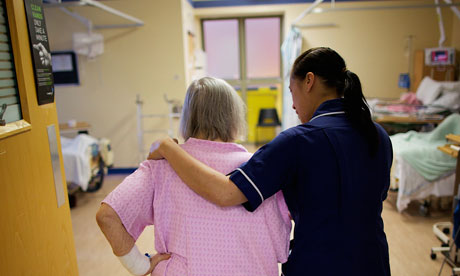For those of you reading this familiar only with the insularity of the housing world, you may be thinking that the new housing minister is the most important change in the Government's recent reshuffle. Perhaps you are right and, as an aside, it's worth noting that Prisk set a welcome change of tone both in public and private at last week's NHF Conference. But allow me to venture that it is actually the new health and social care ministerial team (and their successors) who will have the most profound effect on the world of housing and housing associations - at least if you provide a large scale, generic landlord service meeting the needs of the old and vulnerable.
If you aren't on the same page as me about this yet, perhaps we should wait while you go and have a quick read of this report from the King's Fund. At THT we know that our tenants, in ordinary homes as well as sheltered housing, will get less and less able to cope in their existing accommodation; as they age, their vulnerabilities increase and as cuts to commissioner's budgets result in fewer services delivered in a meaner fashion we are left in whole or in part with the responsibility for their care. We are currently equipped with a set of tools that are woefully inadequate for shouldering this burden. Clearly then we must do something - the question is what? Here's my prescription:
1. We must engage: be the ones to reach out to those health and social care professionals who are now devising the emergent systems, using the language that they speak, to evidence the contribution that housing can make. We can't sit outside the discussions that are now shaping the landscape of care and support bemoaning that "they won't talk to us", but rather articulate the compelling case about the extent of the help we can offer. The language of well-being has much to offer here: our evidence must show how it is that housing organisations can help people in communities to stay connected, be active, take notice, keep learning and give. Of course, as I have covered in previous blogs, having better metrics for assessing the social value of what we do would help here.
2. We must innovate: be prepared to devise a new, people-centred, system of care and support, rejecting the time-constrained, profit driven model of the private sector providers and imitated so often by those non-profits who should know better. There are new models starting to emerge - Southwark Circle combines statutory, voluntary effort with significant self-help within a membership-based organisation devoted to solving life's everyday problems. Models such as this start from a driver of basic humanity - centred on value to the carers and cared for, and not to shareholders.
3. We must invest: be robust with our regulator and our housing minister that value for money is about creating decent lives, and that building new homes, important though it is, isn't the only game in town. If commissioners (currently) are not prepared to meet the full cost of these new innovative models of care and support does that really matter? Most housing associations could choose to cross-subsidise the service from other parts of the business - something most of us have been doing with development for many years.
Do this and we might, just might, have a response to the care and support crisis which will otherwise engulf us and our residents. There is an urgent discussion to be had about social care in 2012; how soon that discussion becomes an argument and at what point that argument becomes an outcry is yet to be seen.
 |
1. We must engage: be the ones to reach out to those health and social care professionals who are now devising the emergent systems, using the language that they speak, to evidence the contribution that housing can make. We can't sit outside the discussions that are now shaping the landscape of care and support bemoaning that "they won't talk to us", but rather articulate the compelling case about the extent of the help we can offer. The language of well-being has much to offer here: our evidence must show how it is that housing organisations can help people in communities to stay connected, be active, take notice, keep learning and give. Of course, as I have covered in previous blogs, having better metrics for assessing the social value of what we do would help here.
2. We must innovate: be prepared to devise a new, people-centred, system of care and support, rejecting the time-constrained, profit driven model of the private sector providers and imitated so often by those non-profits who should know better. There are new models starting to emerge - Southwark Circle combines statutory, voluntary effort with significant self-help within a membership-based organisation devoted to solving life's everyday problems. Models such as this start from a driver of basic humanity - centred on value to the carers and cared for, and not to shareholders.
3. We must invest: be robust with our regulator and our housing minister that value for money is about creating decent lives, and that building new homes, important though it is, isn't the only game in town. If commissioners (currently) are not prepared to meet the full cost of these new innovative models of care and support does that really matter? Most housing associations could choose to cross-subsidise the service from other parts of the business - something most of us have been doing with development for many years.
Do this and we might, just might, have a response to the care and support crisis which will otherwise engulf us and our residents. There is an urgent discussion to be had about social care in 2012; how soon that discussion becomes an argument and at what point that argument becomes an outcry is yet to be seen.



